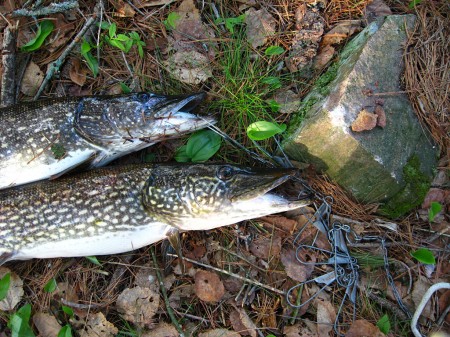The Smoky Lake canoe trip provided a delicious opportunity to deviate from my ordinary shunning of meat-eating. There are three major reasons for which I do not normally eat animal flesh: it is generally produced in a way that is not environmentally sustainable, the animals generally live in very poor conditions, and a number of unhygienic practices are endemic in factory farms. I maintain that when most people choose to eat meat, they do so in either honest or wilful ignorance about the consequences of that choice.
Happily, the trip provided an exception to all those objections in the form of lake-caught pike. I saw the lake they came from, the way they were caught and cleaned, and the way they were cooked. Two fish among eleven people probably isn’t causing damage to the ecosystem, particularly since it is a once a year trip. Furthermore, it is fair to say that a pike living in an attractive lake in Ontario is living an existence true to its nature: a statement that surely cannot be made truthfully about most animals people eat.
In any case, our pan fried pike was exceedingly delicious: as the result of its character, freshness, and the fundamentally food-improving qualities of camping. The experience of seeing it delivered from lake to plate has also made me somewhat rethink my view of sports hunters and fishers. While it is certainly true that ecosystems can be damaged by such activities, it is also fair to say that those who especially enjoy such activities might be passionate, knowledgeable, long-term advocates of conservation. It should be further asserted that – environmental considerations aside – those with such skills can make a most satisfying contribution to an expedition outdoors.


I’m really not sure that the three criteria you mention as ruling out meat-consumption can sensibly be limited to consumption of that good in particular. Let’s say we parse the third condition, about the unnygenic conditions in which most farmed animals live, as one about the general threat which conditions pose: in the case of farmed animals, as sources of disease outbreaks, in other cases, as sources of political violence, criminal organizations, and the like. Similarly, let’s parse the second condition as a concern about the conditions under which those who produce the goods labour. Accepting those reinterpretations – which seem to me reasonable – you ought to be ruling out consuming any goods which meet all three of these conditions: are produced environmentally unsustainably, involve harmful or exploitative labour practices, tend to function as causal factors in promoting various destabilising social practices and formations. That’s going to rule out an awful lot, I’d’ve thought: there’s presumably a pretty good case that you ought not to buy anything made in China, for example.
You should check with the Ministry of Natural Resources — I know that a lot of the lakes in Eastern Ontario that are popular with anglers are annually stocked from hatcheries. Your fish may not be nearly as natural as you thought.
How did you view sports hunters and fishers before?
Padraic,
That’s an interesting point. I wonder if there is any way to find out whether that particular lake is stocked in such a way.
Rob,
You are absolutely right to point out the inconsistency with which the ethical position is applied. For instance, all the arguments I gave against eating meat also apply to eating milk, cheese, and eggs.
In the end, we can only aspire to be as ethical as possible while living acceptable lives. That said, we deserve to be criticized both for our lapses and for the inconsistency of our positions.
FBI looking for vegan potluck terrorists
Milan, there definitely is such a way – I know lots of fishermen in Pembroke who check the MNR records, because they want to fish in stocked lakes and avoid unstocked lacks. I doubt, though, that such data is easily accessible (aka online). If you were really curious, I would call the MNR Pembroke District office.
Did you ever call the lake stocking people?
It seems to me that seals hunted in a sustainable way probably fall into the same moral category as these pike.